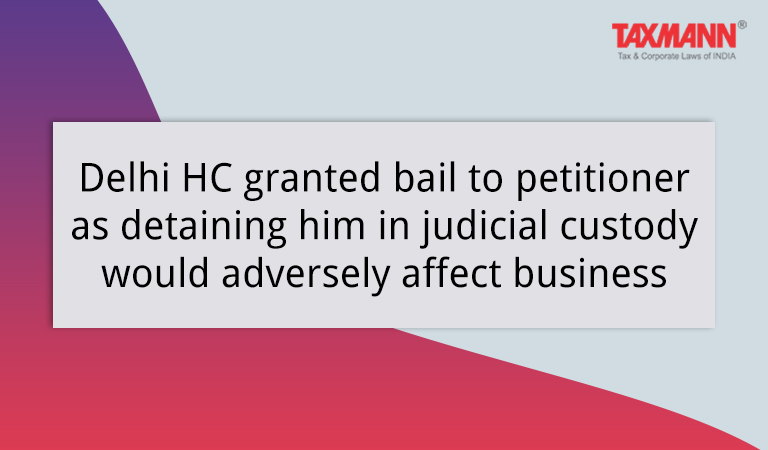Delhi HC granted bail to petitioner as detaining him in judicial custody would adversely affect business
- Blog|News|GST & Customs|
- 2 Min Read
- By Taxmann
- |
- Last Updated on 2 December, 2021

Case Details: Tarun Jain v. Directorate General of GST Intelligence DGGI - [2021] 132 taxmann.com 299 (Delhi)
Judiciary and Counsel Details
-
- Chandra Dhari Singh, J.
- Dr. G.K. Sarkar, Ms. Malabika Sarkar, Prashant Srivastava and Rajiv Tuli, Advs. for the Petitioner. Harpreet Singh for the Respondent.
Facts of the Case
The petitioner was director in a company engaged in supply of services and also supplying solar inverters, solar power generating units and like products. The department alleged that the company of petitioner was involved in fraudulently availing ineligible/fake input tax credit as passed on by firms which were found to be non-existent. The summons were issued multiple times but the petitioner failed to appear before the authorities citing medical problems. He filed an application for Anticipatory Bail but it was rejected. Thereafter, he filed application for bail before the High Court and submitted that the allegations leveled against him were false and frivolous.
High Court Held
The Honorable High Court observed that there cannot be any conflict with the fact that petitioner has been charged with economic offence. In the present case, the petitioner was accused of wrongfully utilizing the Input Tax Credit amounting to Rs. 72 Crores. However, it would be reiterated that the offence does not contemplate punishment for more than five years. Moreover, the offences under the GST Act are not grave to an extent where the custody of the accused can be held to be sine qua non. Also, the detention in judicial custody would affect business of petitioner. Therefore, it was held that bail application would be allowed since Anticipatory Bail is a statutory right and custodial interrogation is neither warranted nor provided for in GST law.
Disclaimer: The content/information published on the website is only for general information of the user and shall not be construed as legal advice. While the Taxmann has exercised reasonable efforts to ensure the veracity of information/content published, Taxmann shall be under no liability in any manner whatsoever for incorrect information, if any.

Taxmann Publications has a dedicated in-house Research & Editorial Team. This team consists of a team of Chartered Accountants, Company Secretaries, and Lawyers. This team works under the guidance and supervision of editor-in-chief Mr Rakesh Bhargava.
The Research and Editorial Team is responsible for developing reliable and accurate content for the readers. The team follows the six-sigma approach to achieve the benchmark of zero error in its publications and research platforms. The team ensures that the following publication guidelines are thoroughly followed while developing the content:
- The statutory material is obtained only from the authorized and reliable sources
- All the latest developments in the judicial and legislative fields are covered
- Prepare the analytical write-ups on current, controversial, and important issues to help the readers to understand the concept and its implications
- Every content published by Taxmann is complete, accurate and lucid
- All evidence-based statements are supported with proper reference to Section, Circular No., Notification No. or citations
- The golden rules of grammar, style and consistency are thoroughly followed
- Font and size that’s easy to read and remain consistent across all imprint and digital publications are applied



 CA | CS | CMA
CA | CS | CMA
